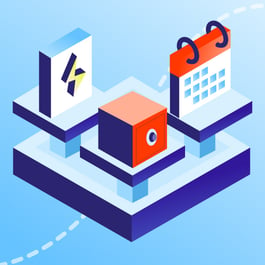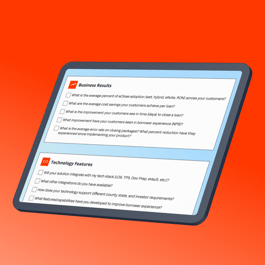Implementing remote online notarization (RON) is a complicated maze of stakeholders and varied legislation that lenders must navigate. There are many external stakeholders involved, such as investors, settlement companies, states, and counties, and each stakeholder is at a different stage of accepting and adopting RON. For example, your settlement partners may already be doing RON eClosings, while your investors may not buy remotely notarized loans.
Just because some stakeholders aren’t as far along as others doesn’t mean you should hesitate to adopt RON. Maintaining the status quo won’t convince other stakeholders in the closing to change their acceptance guidelines, and it certainly won’t move the industry forward.
As you start your journey to RON, it’s important to understand who your key stakeholders are, what your dependencies are on those stakeholders, and how to approach the implementation of RON in this fragmented industry.
How state and county acceptance affect where you can offer remote online notarization closings
Incorporating any new technology into your existing workflow presents challenges. Oftentimes, the issues are internal matters, like setting up the system and training employees. In the case of RON, it’s the external challenges that have a substantial impact on a lender’s ability to use the technology across their loan volume. Not only does limited stakeholder acceptance pose an issue, but technological requirements, financial investments, and legislation all come into play as well.
States
Notaries are commissioned by their state and, as such, their scope of authority is governed by state law. Traditionally, a notary signing agent meets with a borrower in-person to notarize tangible loan documents. This long-established process is supported by state laws nationwide, and counties are set up to record and file paper documents.
For notaries to have the legal authority to conduct a RON, legislation must first be passed at the state level. In 2011, Virginia led the nation by becoming the first state to pass a bill enacting RON legislation. Since then, some states have followed. However, the pace has been slow, and there’s still a long way to go in getting every state to draft and pass RON legislation.
RON currently lacks any federal legislation. There has been recent progress though. On March 19, 2020, two senators introduced the “Securing and Enabling Commerce Using Remote and Electronic (SECURE) Notarization Act of 2020.” If passed, the bill would allow the immediate use of RON nationwide. The act “authorizes every notary in the United States to perform RONs, requires tamper-evident technology in electronic notarizations, and provides fraud prevention through use of multifactor authentication.” The bill hasn’t passed as of August 31, 2020.
Counties
Although lenders aren’t typically in charge of getting the documents recorded with the county, it’s important for them to understand which counties accept remotely notarized documents. Aside from state law, county acceptance also dictates where a webcam closing can be done.
County recorders need to invest in eRecording technology and resources to support the electronic transfer and recording of digital documents. As of August 2019, more than 86% of the American population lives in a jurisdiction that supports eRecording, according to the Property Records Industry Association (PRIA).
It’s important to note that just because a county offers eRecording, it doesn’t necessarily mean that they will also accept remotely notarized documents. eRecording can be used for paper documents, so lenders need to specifically confirm whether a county will record remotely notarized documents.
Since lenders often don’t have insight into the recording capabilities and guidelines of each jurisdiction, work with your settlement partners to identify which counties will record remotely notarized documents.
Understanding the role mortgage industry stakeholders play
A successful rollout requires buy-in and close coordination with the partners you work with on a regular basis. Therefore, it’s important to start the process by knowing who your stakeholders are, finding out which phase of adoption they’re in, and discussing a joint path forward.
Investors
Each investor will determine if they will accept remotely notarized documents and establish any criteria that those loans must meet. Currently, many investors in the secondary market are hesitant to purchase loans that have been remotely executed.
RON sees the most acceptance among the government-sponsored enterprises (GSEs). Fannie Mae, Freddie Mac, and Ginnie Mae allow documents to be remotely eNotarized as long as they meet specific criteria.
Settlement companies
Settlement partners should be consulted early on in the process to ensure a successful adoption. Those who have already done RON transactions are a great resource for navigating the intricacies of RON.
If your settlement partners haven’t already started the transition to RON, you’ll need to work closely with them when rolling out RON. Settlement agents will need to upload their documents to the RON or digital closing technology so they can be eSigned and eNotarized. Your settlement partners will also need to have settlement agents or notary signing agents who are certified and trained to conduct RON.
Title underwriters
You can only do RON transactions if underwriters are willing to insure them. Talk to your underwriters to confirm whether they’ll insure RON eClosings and ask if they enforce any special requirements that reduce underwriting risk.
Warehouse lenders
Lenders who use a warehouse line and want to complete full eClosings with RON will need to check if their warehouse lenders accept eNotes. eNotes are electronic promissory notes that get eSigned. Although they aren’t notarized or recorded with the county, eNotes are required if you want to do eClosings.
If a warehouse lender that you work with doesn’t accept eNotes, you can complete a hybrid closing that includes RON and a paper note. This is a shortcut that lenders can take to quickly offer RON. However, there are major disadvantages to offering this type of hybrid closing long-term. Sending the paper note back-and-forth is costly and time-consuming. Also, when the entire closing is completed digitally except for the note, it creates a poor and disjointed experience for borrowers.
Once you fully understand what dependencies you have on key stakeholders and the laws that govern RON, you can start identifying which of your loans will be eligible for RON. To get more information on RON, its benefits, and a step-by-step guide on how to get started with RON, download our Remote Online Notarization 101: What you need to know about the technology enabling remote digital mortgage closings eBook.
If you’re ready to offer RON, contact us to see how Snapdocs Digital Closing Platform gives you the tools needed for RON and access to the industry’s largest network of notaries and attorneys who are ready to do RON closings.



















